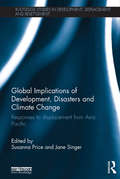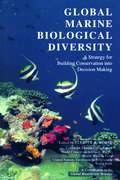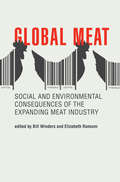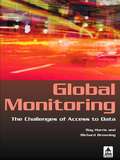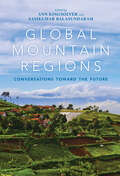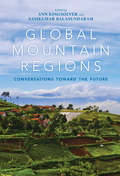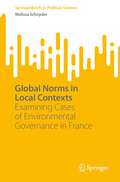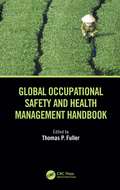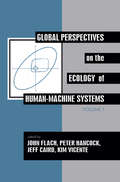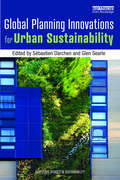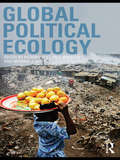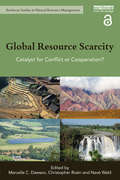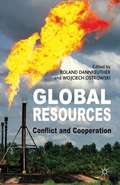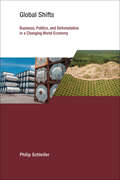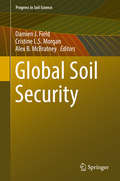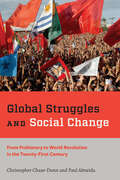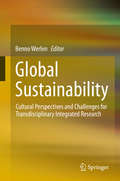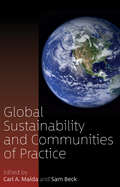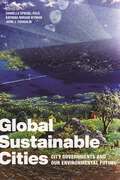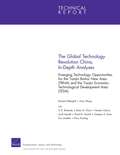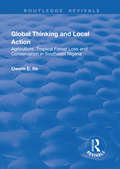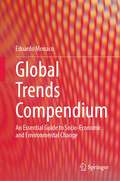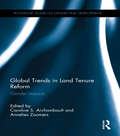- Table View
- List View
Global Implications of Development, Disasters and Climate Change: Responses to Displacement from Asia Pacific (Routledge Studies in Development, Displacement and Resettlement)
by Susanna Price Jane SingerDisplacements in the Asia Pacific region are escalating. The region has for decades experienced more than half of the world’s natural disasters and, in recent years, a disproportionately high share of extreme weather-related disasters, which displaced 19 million people in 2013 alone. This volume offers an innovative and thought-provoking Asia-Pacific perspective on an intensifying global problem: the forced displacement of people from their land, homes, and livelihoods due to development, disasters and environmental change. This book draws together theoretical and multidisciplinary perspectives with diverse case studies from around the region – including China’s Three Gorges Reservoir, Japan’s Fukushima disaster, and the Pacific’s Banaba resettlement. Focusing on responses to displacement in the context of power asymmetries and questions of the public interest, the book highlights shared experiences of displacement, seeking new approaches and solutions that have potential global application. This book shows how displaced peoples respond to interlinked impacts that unravel their social fabric and productive bases, whether through sporadic protest, organised campaigns, empowered mobility or; even community-based negotiation of resettlement solutions. . The volume will be of great interest to researchers and postgraduate students in development studies, environmental and climate change studies, anthropology, sociology, human geography, international law and human rights.
Global Issues: Clean Air and Water
by Cheryl JakabHi there! This is Earth speaking. My environment is being threatened by some serious problems, and I need your help. My global challenge to you is to find ways to manage these issues and to build a sustainable future. The Global Issues series presents six major environmental topics. Each book takes one topic and examines it through five related issues. Each issue outlines the problem and offers solutions for a sustainable future. In Clean Air and Water, learn about the following issues: ISSUE 1 Polluting the air ISSUE 2 Polluting the water ISSUE 3 Fresh drinking water ISSUE 4 Acid rain ISSUE 5 Overuse of water Special features include: * two case studies for each issue * "What can you do?" advice for individuals
Global Marine Biological Diversity: A Strategy For Building Conservation Into Decision Making
by Elliott A. NorseGlobal Marine Biological Diversity presents the most up-to-date information and view on the challenge of conserving the living sea and how that challenge can be met.
Global Meat: Social and Environmental Consequences of the Expanding Meat Industry (Food, Health, and the Environment)
by Bill Winders Elizabeth RansomThe growth of the global meat industry and the implications for climate change, food insecurity, workers' rights, the treatment of animals, and other issues.Global meat production and consumption have risen sharply and steadily over the past five decades, with per capita meat consumption almost doubling since 1960. The expanding global meat industry, meanwhile, driven by new trade policies and fueled by government subsidies, is dominated by just a few corporate giants. Industrial farming—the intensive production of animals and fish—has spread across the globe. Millions of acres of land are now used for pastures, feed crops, and animal waste reservoirs. Drawing on concrete examples, the contributors to Global Meat explore the implications of the rise of a global meat industry for a range of social and environmental issues, including climate change, clean water supplies, hunger, workers' rights, and the treatment of animals.Three themes emerge from their discussions: the role of government and corporations in shaping the structure of the global meat industry; the paradox of simultaneous rising meat production and greater food insecurity; and the industry's contribution to social and environmental injustice. Contributors address such specific topics as the dramatic increase in pork production and consumption in China; land management by small-scale cattle farmers in the Amazon; the effect on the climate of rising greenhouse gas emissions from cattle raised for meat; and the tensions between economic development and animal welfare.ContributorsConner Bailey, Robert M. Chiles, Celize Christy, Riva C. H. Denny, Carrie Freshour, Philip H. Howard, Elizabeth Ransom, Tom Rudel, Mindi Schneider, Nhuong Tran, Bill Winders
Global Monitoring: The Challenges of Access to Data
by Ray Harris Richard BrowningThis highly technical work is at the leading edge of spatial analysis. It covers the Global Monitoring for Environment and Security (GMES) initiative in the international context of access to environmental data. This book identifies the data policy issues, such as intellectual property rights, privacy, licensing and archiving policies, that affect environmental monitoring organisations, statistical institutes, mapping agencies, institutes for natural resources and Earth observation. It recommends courses of action to improve information services in GMES and assesses the impact of data policy on access to and cost-efficient use of information services in GMES. This title will be essential reading for government institutions such as mapping organisations, space agencies, environmental departments, military and defence departments; it will also be useful to students of environmental policies and industries involved in mapping, cartography, aerial surveys and the space industry.
Global Mountain Regions: Conversations toward the Future (Framing the Global)
by Edited by Ann Kingsolver and Sasikumar BalasundaramWorks exploring the responses of global mountain communities to the shared challenges and opportunities their unique locations afford them.No matter where they are located in the world, communities living in mountain regions have shared experiences defined in large part by contradictions. These communities often face social and economic marginalization despite providing the lumber, coal, minerals, tea, and tobacco that have fueled the growth of nations for centuries. They are perceived as remote and socially inferior backwaters on one hand while simultaneously seen as culturally rich and spiritually sacred spaces on the other. These contradictions become even more fraught as environmental changes and political strains place added pressure on these mountain communities. Shifting national borders and changes to watersheds, forests, and natural resources play an increasingly important role as nations respond to the needs of a global economy.The works in this volume consider multiple nations, languages, generations, and religions in their exploration of upland communities’ responses to the unique challenges and opportunities they share. From paintings to digital mapping, environmental studies to poetry, land reclamation efforts to song lyrics, the collection provides a truly interdisciplinary and global study. The editors and authors offer a cross-cultural exploration of the many strategies that mountain communities are employing to face the concerns of the future.“Global Mountain Regions is an outstanding addition to the inventory of the interdisciplinary field of montology, the study of mountains. For any scholar or student interested in the human dimensions of mountain regions, many if not all of the essays will be valuable references.” —American Ethnologist
Global Mountain Regions: Conversations toward the Future (Framing the Global)
by Ann Kingsolver Sasikumar BalasundaramNo matter where they are located in the world, communities living in mountain regions have shared experiences defined in large part by contradictions. These communities often face social and economic marginalization despite providing the lumber, coal, minerals, tea, and tobacco that have fueled the growth of nations for centuries. They are perceived as remote and socially inferior backwaters on one hand while simultaneously seen as culturally rich and spiritually sacred spaces on the other. These contradictions become even more fraught as environmental changes and political strains place added pressure on these mountain communities. Shifting national borders and changes to watersheds, forests, and natural resources play an increasingly important role as nations respond to the needs of a global economy. The works in this volume consider multiple nations, languages, generations, and religions in their exploration of upland communities’ responses to the unique challenges and opportunities they share. From paintings to digital mapping, environmental studies to poetry, land reclamation efforts to song lyrics, the collection provides a truly interdisciplinary and global study. The editors and authors offer a cross-cultural exploration of the many strategies that mountain communities are employing to face the concerns of the future.
Global Norms in Local Contexts: Examining Cases of Environmental Governance in France (SpringerBriefs in Political Science)
by Melissa SchnyderThis Brief discusses the translation of global environmental norms across local contexts in France. It provides a snapshot of how global-level environmental norms travel vertically across levels of governance, from the global to the local, and asks how global environmental norms are (re)interpreted by local-level actors and translated to a particular local context. Chapters focus on three in-depth case studies, each involving multi-stakeholder environmental governance: (1) the Cerbère-Banyuls Marine Nature Reserve, (2) the Thau Fisheries Local Action Group (FLAG), and (3) the Biovallée biodistrict. In each of these cases, the author assesses how twilight norms are used to frame, promote, and generally develop a local discourse that centers on environmental conservation and sustainability. By combining concepts from the literature on norm localization with processes from the literature on norm-based institutional change, this Brief will generate new insights on the dynamic aspects of norm translation. As such, it will be of interest to researchers studying environmental politics, comparative policy, governance, and norms.
Global Occupational Safety and Health Management Handbook
by Thomas FullerThis book was written with the belief that everyone globally has the right to a safe and healthy workplace. An 8-year old carrying bricks in the mid-day sun in Nepal, a pharmaceutical business executive on assignment in Bangladesh, or a mother polishing stone in her home in Tanzania; each has a fundamental right to a workplace free from risk of injury, illness, and death. <p><p> Global Occupational Safety and Health Management Handbook is a broad presentation and discussion of the issues and obstacles facing the Occupational Safety and Health (OSH) profession today in providing safe workplaces globally. Readers can use this book to find resources to assist in the development of their programs and to become informed about the basic structures of international OSH development and governance. Readers can also rely on this book to become more aware of global OSH issues and problems that they may be personally or professionally willing and able to help address. Seasoned OSH professionals can expect to learn about new ways to look at complicated and controversial topics. Young professionals and students can read this book to better understand the important global OSH interrelationships and challenges of the future. <p><p> Features <li>Serves as a one-stop resource for information on important international safety and health topics and issues <li>Provides detailed information about international OSH tripartite, nongovernmental, and professional organizations <li>Describes the various global OSH educational and professional development needs, and international approaches to expanding capacity and awareness of the profession <li>Discusses controversial international OSH working conditions and explains their global impacts
Global Perspectives on the Ecology of Human-Machine Systems (Resources for Ecological Psychology Series)
by John Flach, Peter Hancock, Jeff Caird and Kim VicenteThere is a growing consensus in the human factors/ergonomics community that human factors research has had little impact on significant applied problems. Some have suggested that the problem lies in the fact that much HF/E research has been based on the wrong type of psychology, an information processing view of psychology that is reductionistic and context-free. Ecological psychology offers a viable alternative, presenting a richer view of human behavior that is holistic and contextualized. The papers presented in these two volumes show the conceptual impact that ecological psychology can have on HF/E, as well as presenting a number of specific examples illustrating the ecological approach to human-machine systems. It is the first collection of papers that explicitly draws a connection between these two fields. While work in this area is only just beginning, the evidence available suggests that taking an ecological approach to human factors/ergonomics helps bridge the existing gap between basic research and applied problems.
Global Planning Innovations for Urban Sustainability (Routledge Studies in Sustainability)
by Sébastien Darchen Glen SearleAs the world becomes more urbanised, solutions are required to solve current challenges for three arenas of sustainability: social sustainability, environmental sustainability and urban economic sustainability. This edited volume interrogates innovative solutions for sustainability in cities around the world. The book draws on a group of 12 international case studies, including Vancouver and Calgary in Canada, San Francisco and Los Angeles in the US (North America), Yogyakarta in Indonesia, Seoul in Korea (South-East Asia), Medellin in Colombia (South America), Helsinki in Finland, Freiburg in Germany and Seville in Spain (Europe). Each case study provides key facts about the city, presents the particular urban sustainability challenge and the planning innovation process and examines what trade-offs were made between social, environmental and economic sustainability. Importantly, the book analyses to what extent these planning innovations can be translated from one context to another. This book will be essential reading to students, academics and practitioners of urban planning, urban sustainability, urban geography, architecture, urban design, environmental sciences, urban studies and politics.
Global Political Ecology
by Richard Peet Paul Robbins Michael WattsThe world is caught in the mesh of a series of environmental crises. So far attempts at resolving the deep basis of these have been superficial and disorganized. Global Political Ecology links the political economy of global capitalism with the political ecology of a series of environmental disasters and failed attempts at environmental policies. This critical volume draws together contributions from twenty-five leading intellectuals in the field. It begins with an introductory chapter that introduces the readers to political ecology and summarizes the books main findings. The following seven sections cover topics on the political ecology of war and the disaster state; fuelling capitalism: energy scarcity and abundance; global governance of health, bodies, and genomics; the contradictions of global food; capital’s marginal product: effluents, waste, and garbage; water as a commodity, a human right, and power; the functions and dysfunctions of the global green economy; political ecology of the global climate, and carbon emissions. This book contains accounts of the main currents of thought in each area that bring the topics completely up-to-date. The individual chapters contain a theoretical introduction linking in with the main themes of political ecology, as well as empirical information and case material. Global Political Ecology serves as a valuable reference for students interested in political ecology, environmental justice, and geography.
Global Resource Scarcity: Catalyst for Conflict or Cooperation? (Earthscan Studies in Natural Resource Management)
by Marcelle C. Dawson, Christopher Rosin and NavNavé WaldA common perception of global resource scarcity holds that it is inevitably a catalyst for conflict among nations; yet, paradoxically, incidents of such scarcity underlie some of the most important examples of international cooperation. This volume examines the wider potential for the experience of scarcity to promote cooperation in international relations and diplomacy beyond the traditional bounds of the interests of competitive nation states. The interdisciplinary background of the book’s contributors shifts the focus of the analysis beyond narrow theoretical treatments of international relations and resource diplomacy to broader examinations of the practicalities of cooperation in the context of competition and scarcity. Combining the insights of a range of social scientists with those of experts in the natural and bio-sciences—many of whom work as ‘resource practitioners’ outside the context of universities—the book works through the tensions between ‘thinking/theory’ and ‘doing/practice’, which so often plague the process of social change. These encounters with scarcity draw attention away from the myopic focus on market forces and allocation, and encourage us to recognise more fully the social nature of the tensions and opportunities that are associated with our shared dependence on resources that are not readily accessible to all. The book brings together experts on theorising scarcity and those on the scarcity of specific resources. It begins with a theoretical reframing of both the contested concept of scarcity and the underlying dynamics of resource diplomacy. The authors then outline the current tensions around resource scarcity or degradation and examine existing progress towards cooperative international management of resources. These include food and water scarcity, mineral exploration and exploitation of the oceans. Overall, the contributors propose a more hopeful and positive engagement among the world’s nations as they pursue the economic and social benefits derived from natural resources, while maintaining the ecological processes on which they depend.
Global Resources
by Roland Dannreuther Wojciech OstrowskiThis EU-funded project examines the dynamics of conflict, collaboration and competition in relation to access to oil, gas and minerals. It involves 12 different institutions from across the EU and examines oil, gas and other minerals - spanning geology, technology studies, sociology, economics and political science.
Global Science: Earth/Environmental Systems Science
by John Christensen Teri ChristensenNIMAC-sourced textbook
Global Shifts: Business, Politics, and Deforestation in a Changing World Economy
by Philip SchleiferWhat global shifts in markets and power mean for the politics and governance of sustainability.In recent years, major shifts in global markets from North to South have created a new geography of trade and consumption, particularly in the agricultural sector. How this shift affects the governance of sustainability, and thus the future of the planet, is the pressing topic Philip Schleifer takes up in this book. The processes of twenty-first-century globalization are fundamentally changing the politics and governance of commodity production, Schleifer argues, with profound implications for the environment in the food-producing countries of the Global South. At the center of Schleifer's study are Brazil and Indonesia—two key sites of experimentation in new models of global environmental and commodity governance—where palm oil and soy supply chains have seen unprecedented degrees of private environmental governance in recent years. However, instead of transforming these industries, the diffusion of transnational sustainability standards has accompanied a worsening ecological crisis, with mounting evidence of increasingly strong links between deforestation and globalization in twenty-first-century agricultural trade. To uncover the causes of this governance failure, Schleifer develops a multi-level framework for analyzing how contemporary globalization is reconfiguring the political economies of such industries. The result is the first comprehensive analysis of the shift of global agricultural trade to the South and the deepening crisis of commodity-driven deforestation—and a complex and evolving picture of both the risks and opportunities for sustainability presented by this transformative shift.
Global Soil Security (Progress in Soil Science)
by Damien J. Field, Cristine L. S. Morgan and Alex B. McBratneyThis book introduces the concept of soil security and its five dimensions: Capability, Capital, Condition, Connectivity and Codification. These five dimensions make it possible to understand soil's role in delivering ecosystem services and to quantify soil resource by measuring, mapping, modeling and managing it. Each dimension refers to a specific aspect: contribution to global challenges (Capability), value of the soil (Capital), current state of the soil (Condition), how people are connected to the soil (Connectivity) and development of good policy (Codification). This book considers soil security as an integral part of meeting the ongoing challenge to maintain human health and secure our planet's sustainability. The concept of soil security helps to achieve the need to maintain and improve the world’s soil for the purpose of producing food, fiber and freshwater, and contributing to energy and climate sustainability. At the same time it helps to maintain biodiversity and protects ecosystem goods and services.
Global Struggles and Social Change: From Prehistory to World Revolution in the Twenty-First Century
by Christopher Chase-Dunn Paul AlmeidaDeftly demonstrates how the rise and fall of social movements throughout history is closely linked to economic and political developments.In the early decades of the twenty-first century, an international movement to slow the pace of climate change mushroomed across the globe. The self-proclaimed Climate Justice movement urges immediate action to reduce carbon emissions and calls for the adoption of bold new policies to address global warming before irreversible and catastrophic damage threatens the habitability of the planet. On another front, since the 1980s, multiple waves of resistance have occurred around the world against the uneven transition from state-led development to the neoliberal globalization project. Both Climate Justice and Anti-Austerity movements represent the urgency of understanding how global change affects the ability of citizens around the world to mobilize and protect themselves from planetary warming and the loss of social protections granted in earlier eras.In Global Struggles and Social Change, Christopher Chase-Dunn and Paul Almeida explore how global change stimulates the formation and shape of such movements. Contending that large-scale economic shifts condition the pattern of social movement mobilizations around the world, the authors trace these trends back to premodern societies, revealing how severe disruptions of indigenous communities led to innovative collective actions throughout history. Drawing on historical case studies, world system and protest event analysis, and social networks, they also examine the influence of global change processes on local, national, and transnational social movements and explain how in turn these movements shape institutional shifts. Touching on hot-button topics, including global warming, immigrant rights protests, the rise of right-wing populism, and the 2008 financial crisis, the book also explores a broad range of premodern social movements from indigenous people in the Americas, Mesopotamia, and China. The authors pay special attention to periods of disruption and external threats, as well as the role of elites, emotions, charisma, and religion or spirituality in shaping protest movements. Providing sweeping coverage, Global Struggles and Social Change is perfect for students and anyone interested in globalization, international and comparative politics, political sociology, and communication studies.
Global Sustainability
by Benno WerlenThis book offers new perspectives of transdisciplinary research, in methodological as well as theoretical respects. It provides insights in the two-fold bio-physical and the socio-cultural global embeddedness of local living conditions on the basis of selected empirical studies from Latin America, Asia, Africa, Australia and Europe. The theoretical foundations of ecological research and sustainability policies were developed at the end of the nineteenth century. They are largely based on investigations of living spaces and the evolution and differentiation of varied life forms. This perspective is embedded in the practical and theoretical European problem situations of the past and lacks social and cultural differentiation. The transformation of spatial and natural relations as a result of the globalization process is so radical that new theories are needed to solve 21st century ecological problems. Moreover, in view of the lack of an ontologically sound and promising strategy for transdisciplinary problem solving, as well as an acceptable consideration of the power of cultural schemas relating to natural living's interpretations, there is a strong need to focus on sustainable social practices, habits and routines, rather than on predominantly living spaces or eco-topes. This book elaborates on the transdisciplinary approach by reflecting on the theoretical heritage and a global perspective of sustainability, by focusing on the primary role of a social approach in sustainability research and by putting emphasis on cultural dimension of sustainability. It postulates that global sustainability is grounded in a global understanding of our everyday activities.
Global Sustainability and Communities of Practice
by Carl A. Maida Sam BeckCollaboration between experts and the public is vital for effective community engagement aimed at improving the lives of the most vulnerable in society, whether at the local or global level. Using case-based and theoretical chapters that examine rural and urban communities of practice, this volume illustrates how participatory researchers and students, as well as policy and community leaders, find ways to engage with the broader public when it comes to global sustainability research and practice.
Global Sustainable Cities: City Governments and Our Environmental Future
by Danielle Spiegel-Feld, Katrina Miriam Wyman, and John J. CoughlinPerspectives from worldwide experts on how major cities across the globe are responding to the major environmental threats of our time, including global climate change Over half of the world’s population now lives in cities, and this share is expected to increase in the coming decades. With growing urbanization, cities and their residents face substantial environmental challenges such as higher temperatures, droughts, wildfires, and increased flooding. In response to these pressing challenges, some cities have begun to develop local environmental regulations that supplement national and environmental laws. In so doing, cities have stepped into a role that has been historically dominated by higher levels of government.Global Sustainable Cities takes stock of the policies that have been implemented by cities around the world in recent years in several key areas: water, air pollution, greenhouse gas emissions, and climate adaptation. It examines the advantages—and potential drawbacks—of allowing cities to assume a significant role in environmental regulation, given the legal and political constraints in which cities operate.The contributors present a series of case studies of the actions that seven leading cities—Abu Dhabi, Beijing, Berlin, Delhi, London, New York, and Shanghai—are taking to improve their environments and adapt to climate change. The first volume of its kind, Global Sustainable Cities is a critical comparative assessment of the actions that major cities in the global North and South are taking to advance sustainability.
The Global Technology Revolution China, In-Depth Analyses
by Richard Silberglitt Anny WongChina's Tianjin Binhai New Area and the Tianjin Economic-Technological Development Area commissioned a technology-foresight study to help them plan for economic growth. The authors recommend seven emerging technology applications (TAs)--solar energy, mobile communications, rapid bioassays, new water-purification systems, molecular-scale drugs, electric and hybrid vehicles, and green manufacturing--and describe drivers, barriers, and plans for each.
Global Thinking and Local Action: Agriculture, Tropical Forest Loss and Conservation in Southeast Nigeria (Routledge Revivals)
by Uwem E. IteThis title was first published in 2001. Based on extensive local field research undertaken in and around the Cross River National Park in Nigeria, this book provides a socio-economic study of the tensions between agriculture and nature conservation. Taking a ’bottom-up’ approach and focussing on the farm household and the dynamics of forest farming at household level, it brings together a wealth of new information on the subject of tropical forestry, the causes and dynamics of tropical rain forest loss and the problematic relations between conservation authorities in National Parks and local people. Its conclusions raise important questions about practical ways forward in the development of such areas.
Global Trends Compendium: An Essential Guide to Socio-Economic and Environmental Change
by Edoardo MonacoThis Compendium was conceived as a “pocket compass”, a practical guide that may help readers to orientate themselves while they explore global affairs and attempt to make sense of the highly interconnected, multidimensional challenges of contemporary human development. The book is intended to be an accessible, concise, yet comprehensive reference for anyone who hopes to better understand today’s world and its dramatic complexity. The aim is to highlight a relevant selection of the demographic, socio-economic, geo-political, and environmental macro-dynamics that define our time, and to explore in a practical way the indicators that can be used to monitor their evolution over time. In general, this project stems from the need to apply “systemic thinking” to the study of the world and to develop a holistic perspective that can bridge the gap that for too long has existed across academic disciplines and their respective focuses. The macro-trends featured in the book shed light, in particular, on the change that has been occurring over time in the vast Global South – a portion of the globe that accounts for over 80% of the world’s total population. The book’s ultimate – although not exclusive – target audience is undoubtedly composed of undergraduate students of subjects such as political science, international affairs, international development, human geography and the like. In addition, the Compendium may benefit professionals in both public and private organisations as well as members of the general public seeking to acquire "global development literacy" in manners that are academically sound, but also accessible and concise.
Global Trends in Land Tenure Reform: Gender Impacts (Routledge ISS Gender, Sexuality and Development Studies)
by Caroline S. Archambault Annelies ZoomersThis book explores the gendered dimensions of recent land governance transformations across the globe in the wake of unprecedented pressures on land and natural resources. These complex contemporary forces are reconfiguring livelihoods and impacting women’s positions, their tenure security and well-being, and that of their families. Bringing together fourteen empirical community case studies from around the world, the book examines governance transformations of land and land-based resources resulting from four major processes of tenure change: commercial land based investments, the formalization of customary tenure, the privatization of communal lands, and post-conflict resettlement and redistribution reforms. Each contribution carefully analyses the gendered dimensions of these transformations, exploring both the gender impact of the land tenure reforms and the social and political economy within which these reforms materialize. The cases provide important insights for decision makers to better promote and design an effective gender lens into land tenure reforms and natural resource management policies. This book will be of great interest to researchers engaging with land and natural resource management issues from a wide variety of disciplines, including anthropology, sociology, development studies, and political science, as well as policy makers, practitioners, and activists concerned with environment, development, and social equity.
